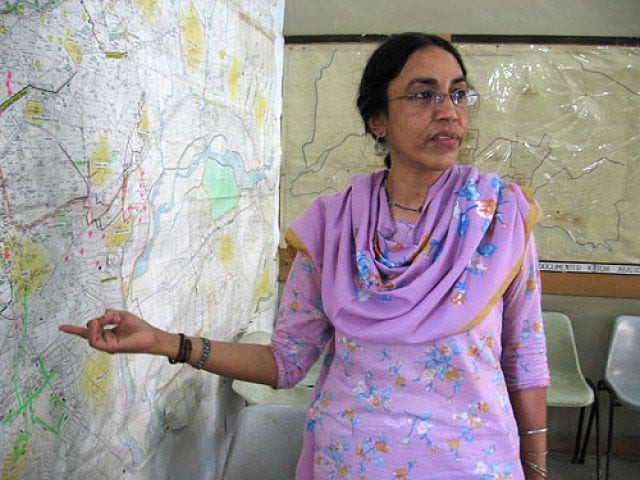Convicts in Rahman murder case acquitted
Two-member bench orders immediate release of accused for lack of evidence

The Sindh High Court (SHC) acquitted on Monday all the five men sentenced in the murder case of social activist Perween Rahman while declaring their conviction and sentencing by an anti-terrorism court in Karachi null and void for lack of evidence.
While issuing a 38-page written judgment on Monday, a two-member SHC bench, headed by Justice KK Agha, ordered the release of Abdul Raheem Swati, Ahmed Khan, Amjad Hussain Khan and Ayaz Swati, and Imran Swati, who were handed jail terms by the anti-terrorism court.
Perween Rahman, a social activist and the then director of the Orangi Pilot Project (OPP), who had devoted her life to the development of impoverished neighbourhoods, was shot dead near her office in Orangi Town in March 2013.
In its verdict, the SHC bench, which also included Justice Zulfiqar Ali Sangi, observed that none of the accused had been charged with “actually murdering” Rahman. Instead, they were charged with “planning, instigating and in effect abetting the murder”.
The judges also agreed with the appellants’ lawyer that Rahman’s interview, which she gave in 2011 and was aired after her murder, was inadmissible evidence. Legally, the interview has no status, the lawyers had argued during trial.
The lawyer had also argued that they were also not given any cross-examination opportunity on the basis of the interview. They had further said that the victim had not recorded her statement before any court. Therefore, the court concluded that the interview be excluded from the case.
Moreover, Babar Bakht, a member of the joint investigation team (JIT) that had probed the high-profile murder, also said in his statement that the victim had made general accusations against political parties in her interview, adding there was no specific charge against any of the accused facing trail.
According to the judgment, the empties found at the crime scene matched with the handgun of Qari Bilal, one of the accused, who was killed in a police encounter, while the casings of the weapon used in the murder did not match the firearm of the accused.
The SHC verdict also stated that nothing could establish a link between the accused and Bilal. The judges stated that the prosecution did not conduct further investigation in this regard and hence the evidence was of no value.
The court also observed that the status of the JIT that probed Rahman’s murder was no more than the case challan, stating that other points mentioned in its report had already come to light. On the basis of the JIT report, the court could not decide to convict or exonerate an accused, the court said.
The verdict added that the charges of aiding and abetting the murder had also not been proven, adding that the benefit of the doubt is given to the accused. Not one, many doubts have been found in the case, the verdict added while terming the sentence awarded by the trial court null and void.
The ATC-VII in Karachi had convicted the accused in December 2021 after almost eight years of proceedings. Three of the accused were handed 57 years and six months in jail, while Raheem Swati was sentenced to 50 years in jail and his son Imran Swati to seven and a half years imprisonment. The ATC judge also imposed a fine of Rs200,000 on each of them.
Rahman, died on March 13, 2013, when four gunmen opened fire on her vehicle near Pirabad police station in Orangi Town. A renowned social activist, Rahman had been an outspoken critic of the land mafias in Karachi and their political patrons.
Having a postgraduate diploma in housing, building and urban planning from the Institute of Housing Studies in Rotterdam, Netherlands, Rahman worked for 28 years, advocating for land and basic services rights for the underprivileged.
After the SHC ruling, Rahman’s family said they would challenge acquittal verdict in the Supreme Court. Aqeela Ismail, Rahman’s sister told a private TV channel that the verdict is "beyond comprehension". She added that the lives of her family members and the OPP employees were in danger after the release of the accused.
Aqeela Ismail urged the authorities to detain the acquitted men under the Maintenance of Public Order (MPO) Ordinance, 1960. She also requested the Sindh government to file an appeal against the verdict of the SHC in the murder case immediately. She also demanded of the federal government provide them justice.
(WITH INPUT FROM NEWS DESK)



















COMMENTS
Comments are moderated and generally will be posted if they are on-topic and not abusive.
For more information, please see our Comments FAQ